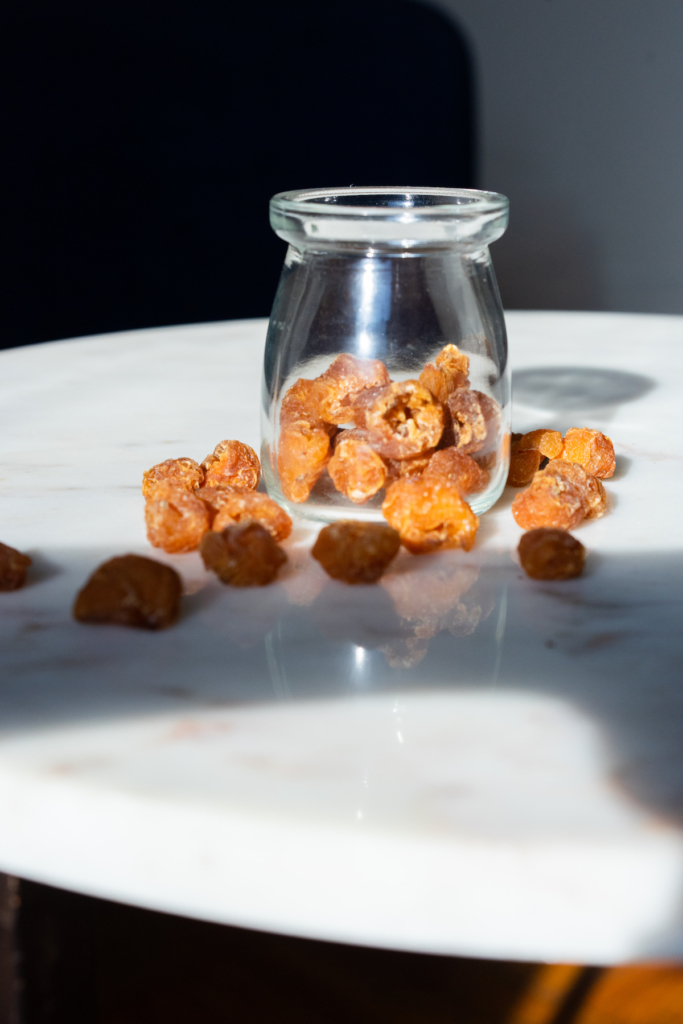WHY TO GET AN EASTERN MEDICINE SLEEP ROUTINE
And How To Do It

A good night’s rest is one thing we can sometimes take for granted, but after a couple of nights of lackluster snoozing, you’ll likely be grumpy, lacking focus, and feeling pretty blah. Instead of waiting until you’re desperate for zzzs, take a look at how Eastern medicine preps you for getting consistently good sleep…
Chinese Medicine and Sleep Patterns
According to Eastern medicine, the root cause of insomnia and poor sleep cycles is an energy imbalance.
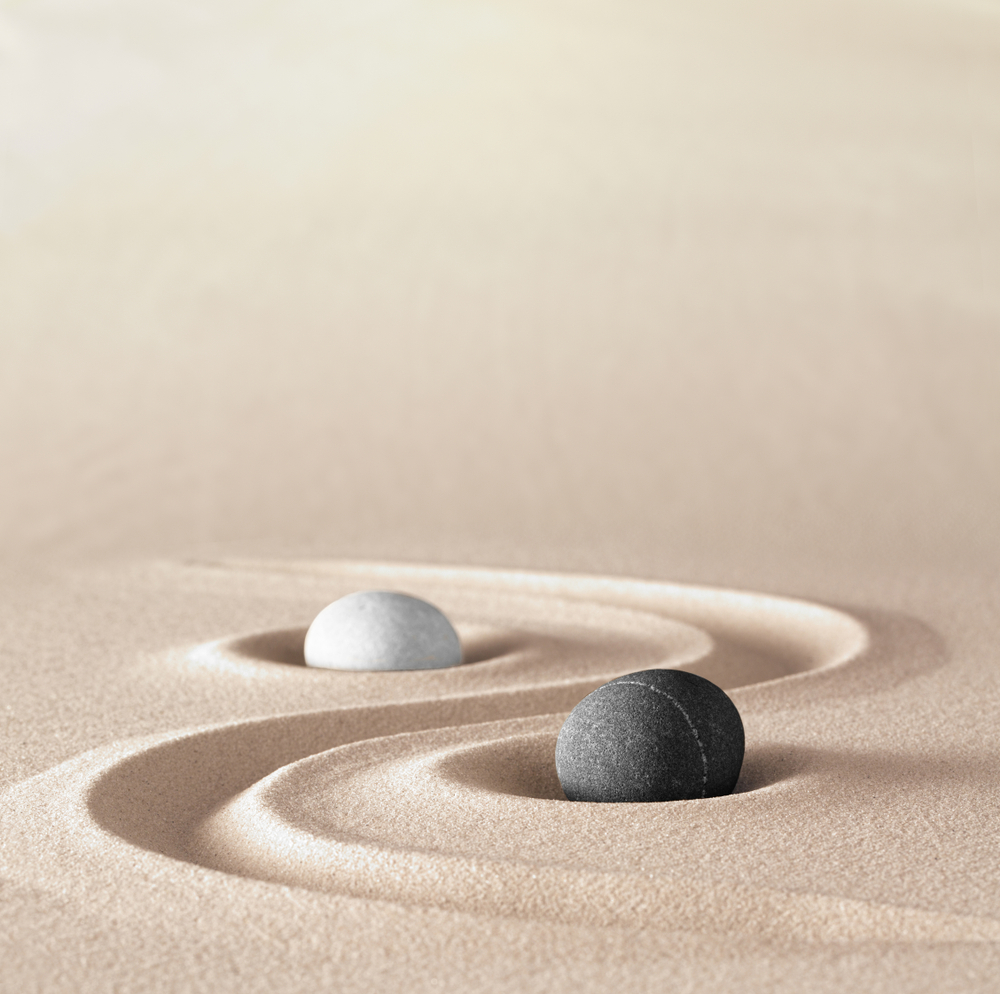 Yang energy is like the morning gusto you feel pushing you through the day. It’s dominant while we are awake, busy with our daily tasks. On the other hand, Yin energy is dominant as we unwind for the day and sleep through the night. It’s the wind down relax feeling you get.
Yang energy is like the morning gusto you feel pushing you through the day. It’s dominant while we are awake, busy with our daily tasks. On the other hand, Yin energy is dominant as we unwind for the day and sleep through the night. It’s the wind down relax feeling you get.
Our sleep cycles are controlled by this push and pull, rise and fall of Yang & Yin qi (energy). If you have too much Yang, you’ll be restless in bed, unable to fully relax and let Yin take over. Keeping these sleep patterns in a natural, repetitive cycle is the key to consistently good sleep.
Eastern Medicine Sleep Meridians
To understand the link between TCM and sleep patterns, we have to understand what sleep meridians are. These pathways essentially carry energy to its destination and back in an endless circle.
Given the cycle of this in the human body, twelve of these meridians are linked to a specific organ and each organ is linked to a specific time of day- aka the Chinese body clock. Basically, your energy flows to where it’s needed to support what your body needs at that time.
Falling asleep between 9:00 p.m. and 11:00 p.m. ensures we reach a deep sleep by the time our liver goes to work cleaning itself. Waking up during the night disrupts our sleep cycle and, thus, the body’s processes.
If you find yourself waking up during a specific time, it could also indicate imbalances within particular organs.
- 10:00 p.m. – endocrine and metabolic balancing
- 12:00 a.m. – gall bladder working
- 2:00 a.m. – liver working
- 4:00 a.m. – lungs detoxing
TCM Herbs for Insomnia and Anxiety
If you are having trouble sleeping, it could be linked to what you eat before bed. Sweet, spicy, or acidic flavors fall into the “Yang food” category. So, things that heat up the body will mess with your ability to rest.
Foods that have a calming, cooling effect are considered Yin. Any food that is green-colored, full of moisture, and is relatively neutral would be cooling. Tofu, watermelon, and fish are examples.
Swap your late-night Yang meal with Yin flavors, and see if that helps you fall asleep faster. These TCM herbs are also fabulous for treating insomnia and anxiety.
Longan Fruit
Longan fruit is another great TCM herb. This fruit is known to improve the circulation of blood and oxygen. Snack on some longan fruit dried, raw, or steeped as a tea.
Chrysanthemum
Chrysanthemum is a superfood for every poor sleeper. Just one cup of brewed, herbal chrysanthemum tea will clear out any excess Yang energy from your liver. The liver is related to the hours of 1-3 a.m., so drink chrysanthemum tea if you find yourself awake during that time.
Poria
The fungus Poria (Fu ling) is commonly prescribed for insomnia and restless anxiety. It is a TCM herb that can be added to congee and eaten before bedtime. For extra effect, get the fu shen which is still attached to its pine root. While Poria can drain dampness and help with sleep disturbances, it will help those people who tend to retain water the most.
Suan Zao Ren (Zisyphus) Seed
Zisyphus seed promotes good circulation, calms an overactive mind, and relieves tension. Steep the seeds for an herbal tea or you can find tinctures like lunawell that combine this will other helpful sleep herbs.
Does Acupuncture Improve Sleep Patterns Too?
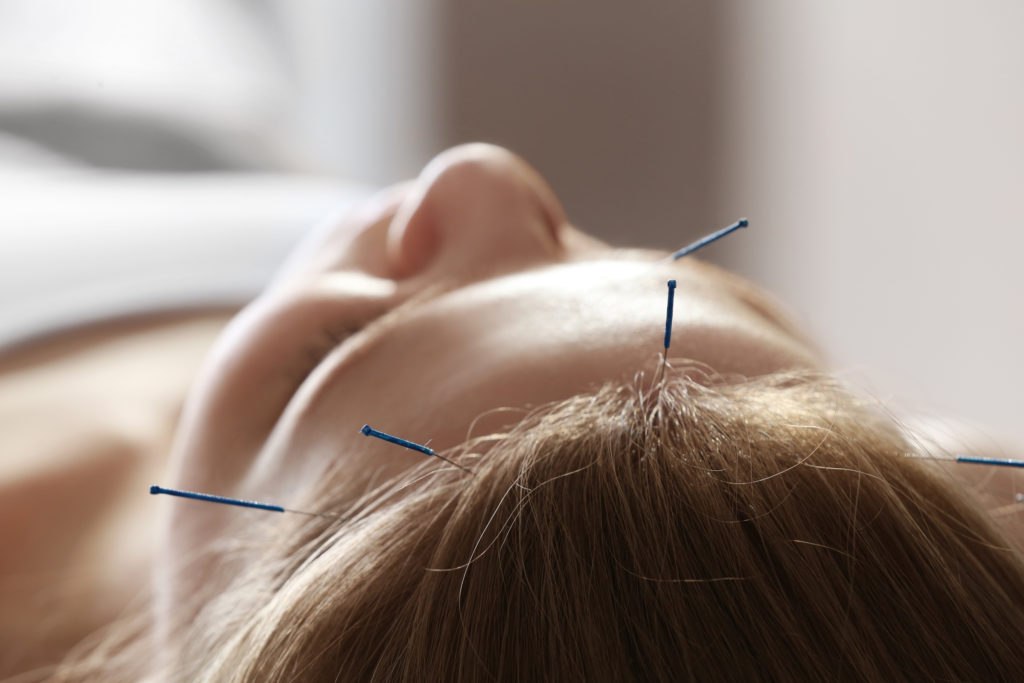 The quick answer, yes.
The quick answer, yes.
Acupuncture has a calming effect on the body’s nervous system. You’ll breathe deeper, feel relaxed, and have an overall sense of well-being. Acupuncture also clears any energy blocks along sleep meridians, which will assist with getting a good night’s rest.
Who thought getting pricked with needles would make one sleep better? We joke, but seriously, it helps.
When you go to receive your acupuncture treatment, the acupuncturist will ask you questions to discern which techniques will be best for you. Usually, acupuncture treatment for insomnia or other sleep disorders involves the insertion of needles near the hands, neck, and feet.
Other Holistic Ways to Sleep Better
There are plenty of other holistic ways to get a full night’s rest besides working with Eastern medicine herbs, energy meridians, and balancing Yang & Yin. The first way is actually our favorite.
Soak Your Feet in Warm Water
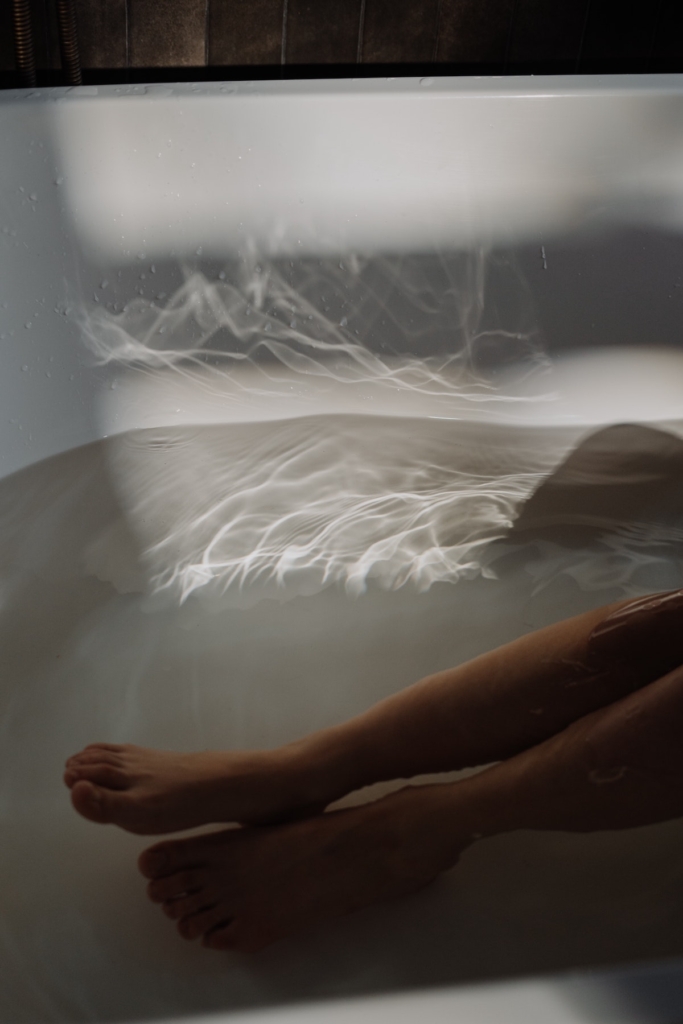 Nothing says soothing like warm water. A hot bath might be the first thing that comes to mind when we say “soak”, but not in this case. We’re talking feet + legs. Start off by massaging your calves, ankles, and feet to encourage downward blood flow.
Nothing says soothing like warm water. A hot bath might be the first thing that comes to mind when we say “soak”, but not in this case. We’re talking feet + legs. Start off by massaging your calves, ankles, and feet to encourage downward blood flow.
Next, get a dishpan or something big enough to hold both feet plus some water. Slowly pour warm water into the pan. Now, it shouldn’t feel like you just stepped into a scalding hot tub, but you want to break out in a mild sweat. For an added bonus, throw some lavender flowers or essential oil into the foot soak.
Ditch the Caffeine
Now, this one might be obvious, but we still have to mention it. So many people drink caffeine too closely to bedtime and then realize- lying awake at 2 a.m.- they shouldn’t have. Part of creating a healthy sleep routine is being in tune with your body. Know your cutoff time for caffeine to prevent insomnia later.
As a matter of fact, ditch the afternoon caffeine for a cup of caffeine-free tea. When the body craves a specific liquid, it’s usually because we are thirsty and need hydration, not because we can’t live without a vanilla latte.
Blue Light Blocking
It can help if you wear yellow-blue-blocking glasses or a computer program that blocks the light system most disturbing to sleep for your last few hours awake.. Some smart phones come with them standard.You have light -sensing receptors all over your body, so while sleeping in an environment with light, cover your skin, and try a blindfold.
Tech-Free Sleeping
Your sleep patterns will change forever if you follow the philosophy of tech-free sleeping. Seriously. About an hour before bed, put the phone away and turn off the TV. You could even go a step further and keep all technology out of your bedroom. The point is to slowly wind down from the day’s activities- undistracted and unbothered. It’s hard to fully relax when you hear your notifications popping off like microwaved popcorn.
So, stop checking those notifications and disconnect from tech before bed. This will free your mind and give you more opportunity to do other calming, holistic activities- like the last two points below.
Meditate
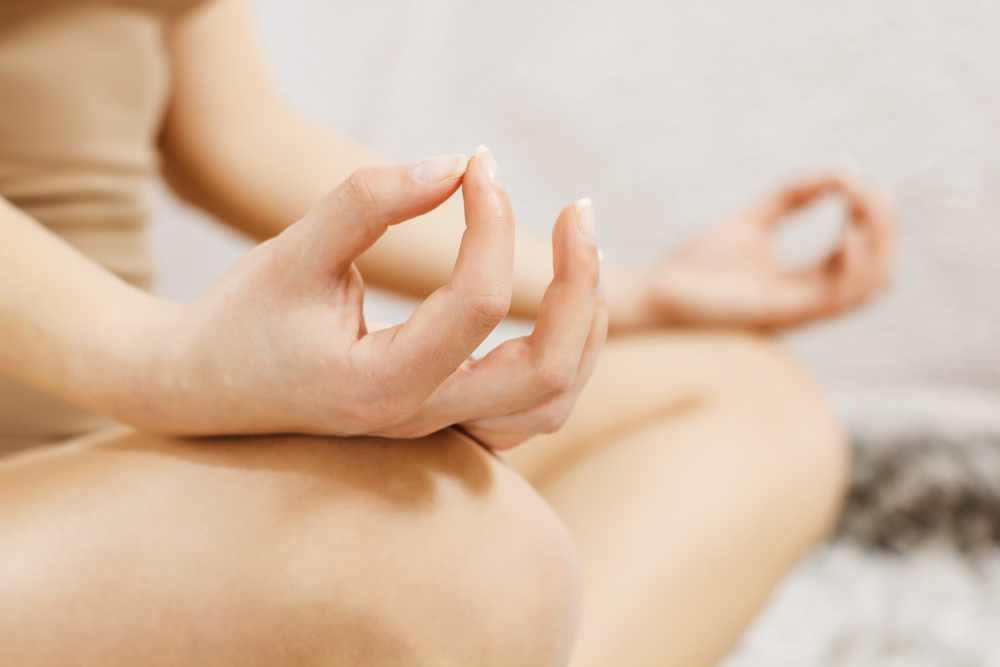 Dim the lights and unplug your mind. It’s time to meditate. In case you aren’t convinced meditation will cure your insomnia, think again. About 75% of insomniacs who have started a daily meditation routine have found that they can fall asleep within 20 minutes. That’s incredible.
Dim the lights and unplug your mind. It’s time to meditate. In case you aren’t convinced meditation will cure your insomnia, think again. About 75% of insomniacs who have started a daily meditation routine have found that they can fall asleep within 20 minutes. That’s incredible.
There’s a reason why this Eastern medicine practice is connected with healthy sleep patterns. Meditation allows the mind to relax, releasing all thoughts and anxiety fully. Focus on your breath, and simply exist in the present moment.
Journal
Journaling is another fan-favorite holistic practice. It is a powerful healing tool that can relieve insomnia and other mental & emotional issues as well. When we write, we are transferring all the noise in our head into reality. Talking is great, but once it’s said, the words are lost in space.
Writing is permanent. There’s something compelling (and calming) about jotting down one’s thoughts and then re-reading what was on one’s mind. So, pick up a pen and write your heart out- no rules, just stream of consciousness on paper.
Get On an Eastern Medicine Sleep Cycle
Let’s be real; we could both use a few extra hours of sleep. Sometimes those ASMR and “soft rain for sleeping” videos don’t cut it. When insomnia hits, it hits hard. However, there is hope you can still catch plenty of Zzzs by fusing Chinese medicine and your sleep patterns.
If TCM teaches us anything about sleep cycles and insomnia, it’s that we need to take better care of our bodies. The reason you might be waking up spontaneously- probably- has more to do with your internal workings than you imagine. If your body’s alarm clock is going off at 3 a.m. regularly, pause and listen to what it is saying.
We hope you get your best night’s sleep yet.
Whether your sleeplessness is rooted in your energy meridians or excess caffeine, everyone deserves peaceful rest. So, grab a cup of chamomile tea and put the phone away for now. Oh, and don’t forget to fall asleep between the magical hours of 9 p.m. and 11 p.m.
Newer
3 Eastern Medicine New Year's Resolutions For 2022
Older
Recover From Holiday Stress & Overeating Naturally With Eastern Medicine
Comments (0)
Leave a reply
You must be logged in to post a comment.

